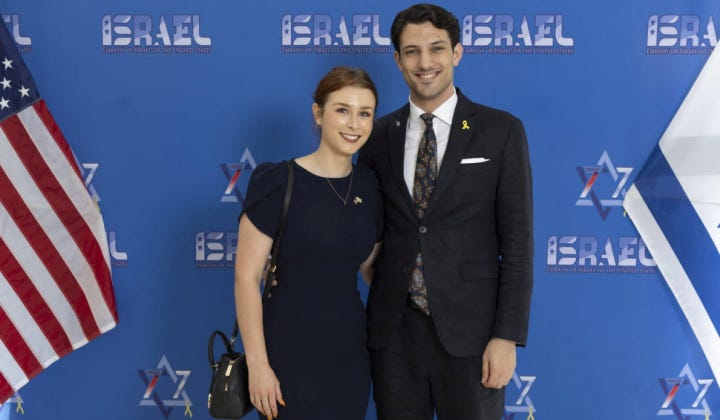Throughout my college years, Israel’s embassy in Washington, D.C., became more than just a diplomatic post — it became a home. It was a place of grounding and belonging amid the turbulence of campus life. From volunteer work to student leadership forums, from Hanukkah and Yom Ha’atzmaut celebrations to moments of crisis, advocacy, and solidarity, the embassy staff embraced me like family. Within its walls, I feel not only humbled but empowered to contribute to something larger than myself, something noble and necessary.

Two individuals, in particular, embodied the spirit of that home: Yaron Lischinsky and Sarah Milgrim. While I never had the chance to know Sarah personally, I had the privilege of working closely with Yaron, whose composure and deep passion left a lasting impression on me. His bright eyes and radiant smile greeted me the first time I walked through the embassy’s doors as a volunteer, and never failed to do so afterward. In the harrowing days following October 7, 2023, when a coalition of students eagerly rallied to support the embassy, it was Yaron who welcomed us. He didn’t just open the door to a building — he invited us into a mission.
On our first day, Yaron led us into a room where students, embassy staff, and diplomats worked side-by-side for hours. The work was often emotionally taxing — each name, each story, each image of an Israeli victim, weighed heavily on us. Still, we returned the next day, and the day after that, for many weeks. Yaron was always there, smiling, ready to greet and lead.
It may sound strange to admit, but looking back, I miss those days — some of the most tragic days I’ve lived through. My commutes to the embassy were often in tears: for the murdered, the kidnapped, the wounded, the grieving families, and the ravaged kibbutzim. Yet inside the embassy, something sacred took shape. We listened to testimonies, wrote, edited, created — becoming keyboard warriors committed to truth and dignity at a time when the definition of those very words felt absent.
To Yaron, we weren’t mere volunteers or Israel advocates — we were partners, friends, and, in time, family. Amid both moral and physical crisis, he helped us find steady ground. He gave us structure and direction. He helped us translate pain into purpose. He empowered us to tell Israel’s story with clarity and conviction, to stand up against lies, and to defend the Jewish people with both compassion and courage.
The bond I formed with Yaron was forged in fire — born of grief, purpose, and shared resolve — and is one I will carry with me always. Alongside the embassy staff, he helped unify and empower a group of students reeling from trauma. Yaron reminded us that resilience is not born from comfort, but from moral clarity and strength of spirit. He reminded us that defending what is right is a duty that transcends borders and spans generations. As we now mourn the brutal act that took his and Sarah’s lives, that lesson becomes all the more urgent — and must never be forgotten.
That’s what makes the truth so devastating — a weight that sits like a stone in my heart: Yaron and his partner Sarah, whom he planned to propose to in Jerusalem this week, were taken by the very hatred they dedicated their lives to confronting. This wasn’t senseless violence in a vacuum. It was fueled by the same antisemitism and the same ideological rot that has seeped beyond Israel’s borders, infiltrated our institutions, and has now metastasized into violence that has taken their precious lives.
In memory of Yaron and Sarah, we must not look away. Every global citizen — and especially every Jew — must confront the radicalization seeping through our schools, our streets, and our institutions. We must reject the normalization of antisemitism and the moral cowardice that hides behind slogans like “academic freedom” or “free expression” to excuse this hatred and allow it to fester.
We must speak the truth and pursue the peace that Yaron lived for. Yes, we must fight for peace — because this very threat, the brutal murder of innocent, beautiful Israeli and Jewish lives, even in the streets of the free world, is now our reality. May his memory, and Sarah’s, be not only a blessing but a call to action for all humanity.
This article was originally published in the Algemeiner on May 26, 2025.



